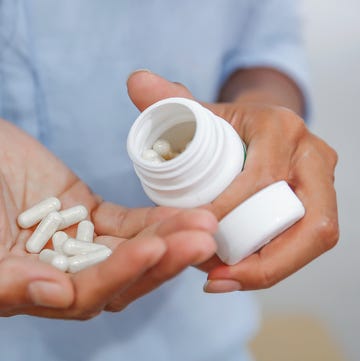Vitamin D supports your immune system, muscle function and bone health, but now there’s another reason to consider taking it in supplement form. According to a new study in The American Journal of Clinical Nutrition, a daily dose of vitamin D3 may significantly delay aging by protecting the DNA stored in your chromosomes.
By analyzing more than 1,000 people aged 50 and older from the ongoing larger VITAL randomized trial at Brigham and Women’s Hospital in Boston, researchers from Harvard and the Medical College of Georgia, found taking 2,000 IUs of a vitamin D3 supplement daily over four years helped decelerate the aging process. How? It turns out vitamin D3 can help to maintain the length of your telomeres, which are the protective caps at the ends of your chromosomes, like the plastic casings found on shoelaces.
The findings are important because if telomeres shorten too quickly or by too much, the shortening can speed up the body’s biological aging process, says the study’s principal investigator JoAnn E. Manson, MD, DrPH, an endocrinologist, Chief of the Division of Preventive Medicine at Brigham and Women's Hospital and a professor of medicine at Harvard Medical School in Boston, MA.
While this study isn’t the first to investigate the potential benefits of a vitamin D3 supplement on telomeres, it is the largest and the longest-term randomized trial to specifically explore the subject. Here’s a deeper dive into what the scientists uncovered.
The role of telomeres in the aging process
The first thing to know is telomere shortening is an inherent part of getting older and occurs with everyone. In fact, their length is considered a marker of cellular aging. “Telomeres keep your chromosomes stable and prevent them from fraying or degrading when cells are replicating and dividing, and this helps to prevent damage to the cell’s DNA,” says Dr. Manson.
Cell division and replication is a natural biological function of aging, and when each cell divides or replicates, the telomeres shorten a bit. The shortening means there’s more of a chance the DNA in our chromosomes will be more vulnerable to damage and degradation, putting you at an increased risk of age-related chronic diseases, such as heart disease and certain kinds of cancers, including bladder, brain, esophageal and lung, says Dr. Manson.
Telomere shortening is also associated with some inflammatory conditions, such as rheumatoid arthritis and diabetes. The researchers were curious to see if one of the supplements they’ve been studying in the VITAL trial might have a positive response for preserving telomere length.
“Given that we’ve seen the benefits of vitamin D for reducing or ‘tamping down’ inflammation and in lowering the risk of autoimmune diseases, in this study we were interested in seeing whether it has a role in slowing down the clock for biological aging, which is also linked to inflammation,” says Dr. Manson.
What the study found
The five-year study tracked 1,054 U.S. adults, comprised of women aged 55 or older and men 50 and older. Researchers chose to examine people 50 and older because it’s during this time when the chances of chronic diseases start to increase, notes Dr. Manson.
Individuals were divided into two groups: One was given a placebo, while the others took both a daily vitamin D3 (2,000 IUs) supplement and a separate omega 3 fatty acid (1 g.) supplement. To examine telomere length in the participants’ white blood cells, blood was taken at the start of the study, and again at the second- and fourth-year mark.
At the beginning of the study, the two groups were identical, but at the two-year point, the researchers saw those in the vitamin D3 group had less telomere shortening. However, it was at the four-year mark where the differences really became apparent. It turns out compared to the placebo group, those who took the vitamin D3 supplement significantly reduced their telomere shortening, preventing the equivalent of nearly three years of aging. The omega 3 fatty acid supplement had no real significant effect on telomere length.
A possible explanation? “We found a reduction in an inflammation C-reactive protein [in the vitamin D3 group] and think the effect of vitamin D3 in tamping down inflammation may be one of the reasons for less telomere shortening,” says Dr. Manson.
Dr. Manson says her team was surprised by the magnitude of the study. “We did expect vitamin D would slow telomere shortening but didn’t expect to see such a difference in when it came to the time period,” she reports.
Although the vitamin D3 looks promising as a pathway to counter biological aging, Dr. Manson says more research needs to be done. “We always say a study’s findings need to be replicated, so we want to see if these results are the same in another large trial before public health guidelines can be changed.”
What are the best sources of Vitamin D?
As far as food goes, good sources of vitamin D are salmon, tuna, trout, sardines, eggs and vitamin D fortified foods such as milk, yogurt, cereals, and orange juice, says Heidi J. Silver, R.D., M.S., Ph.D., a registered dietitian and research professor of medicine in the Division of Gastroenterology, Hepatology and Nutrition at Vanderbilt University Medical Center in Nashville, TN.
“It’s important to remember vitamin D is produced in the skin from UV-B light, so dietary intake contributes a small amount to total vitamin D storage and blood levels,” says Silver. “There is guidance to include some sunlight exposure, the actual safe amount is unclear, but the consensus for healthy people seems to be not more than 30 minutes, twice a week without sunscreen for enough vitamin D synthesis via the skin.”
Silver says the best advice is not to be vitamin D deficient, and individuals meet their needs with the recommended daily amount of 600 to 800 IUs a day for adults.
But if you want to take a daily supplement of up to or equivalent to 2,000 IUs, it certainly won’t hurt you. “For people who may be concerned they’re not getting enough vitamin D from their diet or sunlight, it’s okay to take 1,000 to 2,000 of IUs a day,” advises Dr. Manson. “You can also see if your multivitamin has that amount, many do have 1,000 IUs of vitamin D,” she says.

















